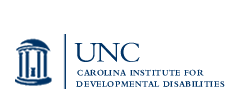Fragile X Studies
CONNECT-FX: a clinical trial for 3-17 year olds with FXS
Recruiting:
Boys and girls between 3 and 17 years old with the fragile X full mutation.
This study will evaluate the effects of cannabidiol (CBD) applied as a gel to the skin on social anxiety/avoidance.
Study visits take place at the Carolina Institute for Developmental Disabilities in Carrboro, NC. with Laura Politte, MD. The University of North Carolina at Chapel Hill.
Sponsored by Zynerba Pharmaceuticals.
Study Brochure: Download
Study Contact: Eliza Dubose elizabeth_dubose@med.unc.edu or call 919-962-5500
Modifiers of Fragile X-Associated Disorders: tracking down genes that interact with FMR-1
Recruiting:
This is a project recruiting persons who carry the FX premutation or full mutation and their extended family members (tested or untested). THE SEIZURE STUDY needs individuals with full mutation FXS with and without seizures.
THE FXTAS STUDY needs individuals with premutation who have early symptoms of FXTAS and males with premutation with no symptoms of FXTAS before 70 years of age.
THE FXPOI STUDY needs females with premutation who experienced menopause before age 40 and females with premuation who experienced menopause after age 50.
The goal of the project is to discover genes that affect the risk and severity of three fragile X-associated disorders: FXTAS, FXPOI, and seizures in males with FXS.
Participation activities vary, but most can be completed from home and do not require travel.
This study is being conducted by the Emory University Fragile X Center. It is funded by the National Institute of Child Health and Human Development (NICHD).
Study Brochure: Download
Study Contact: Krista Charen; LIsa Shubeck krista.charen@emory.edu; Lshubec@emory.edu or call 404-778-8479 / 404-778-8478
Language In FXS
Recruiting:
Boys with fragile X syndrome between 9 and 16 years old, use spoken language as a primary means of communicating, and use 2 or 3 word sentences
Participation involves: standardized tests related to grammar and language; having a short conversation with the examiner; and a parent interview and questionnaires.
Duration--Two sessions at the Waisman Center lasting about two hours each. Both sessions can be scheduled for the same day or split between 2 consecutive days.
Testing is scheduled at your convenience, including weekends.
Dr. Audra Sterling, Waisman Center, University of Wisconsin-Madison
Study Brochure: Download
Study Contact: Audra Sterling asterling@waisman.wisc.edu or call 608-890-0752
Longitudinal MRI Study of Brain Development in FX Follow Up
Recruiting:
Boys between 4 and 9 years of age who have a fragile X full mutation diagnosis and live in the US.
This multi-center study involves the close collaboration of two sites: University of North Carolina and Stanford University. The current project is a continuation of a study of infants and preschoolers with FXS where our research groups identified patterns of early abnormal brain growth. The new study will follow up with the children from the initial study, who are now between the ages of 8 and 14, as well as enroll a group of new participants between 4 and 9 years of age.
Dr. Joseph Piven, University of North Carolina at Chapel Hill and Dr. Allan Reiss, Stanford University
Study Brochure: Download
Study Contact: Heidi Bryant heidi.bryant@cidd.unc.edu or call 919 966-5278
NC Early Experiences with Fragile X
Recruiting:
Children birth to 5 years old with fragile X syndrome and their parents
Study Brochure: Download
Study Contact: Anne Edwards fragilex@rti.org; anneedwards@rti.org or call 866-214-2044
The Relationship between Language and the Brain in Fragile X
Recruiting:
The Waisman Center at the University of Wisconsin-Madison is recruiting boys with fragile X syndrome and autism spectrum disorder for a study on language and communication skills and Magnetic Resonance Imaging (MRI). Boys should be between 9 and 18 years of age, and speaking in at least 2-3 word phrases.
The purpose of this research is to better understand how children with fragile X and children with autism use language. Participants will complete standardized tests, a conversation language sample, as well as an autism diagnostic evaluation. Parents will complete an interview about their son’s behaviors and communication abilities. Participants will also undergo an MRI scan and we will ask parents to help make your son comfortable in the MRI scanner during the scan. All of the testing is done at the Waisman Center, and can be scheduled at your convenience.
Travel costs (e.g., flights, mileage, hotel) will be paid for by the project, and families receive $150 for participation.
Study Contact: Susen Schroeder sschroeder@waisman.wisc.edu or call 608-263-5145
Brain Functioning Study: Adults with Fragile X Syndrome
Recruiting:
This research seeks to understand how protein formation in the brain is affected in fragile X syndrome (FXS). Researchers will measure the rate at which the brain makes proteins (protein synthesis) and may identify specific parts of the brain affected in FXS. In the future, measurement of protein synthesis in FXS may help us to develop and test new therapies.
The study enrolls eligible young men with FXS, ages 18-24, from around the world, and includes one visit, lasting several days, to the NIH Clinical Center in Bethesda, Maryland.
Study Includes: Assessment by physicians, blood draws, two brain scans (PET & MRI), and possible sedation. The cost of travel, food, and lodging, are covered and include the study participant and one or two accompanying family members. Compensation is paid for your time and assistance.
Study Web Site: https://www.nimh.nih.gov/labs-at-nimh/join-a-study/adults/adults-fragile-x-syndrome.shtml
Study Brochure: Download
Study Contact: Inna Loutaev loutaevi@nih.gov or call 240-444-3201
Hair Follicle Study at UMass Medical School
Recruiting:
We are looking for volunteers male and female.
Children between 3 and 12 years of age who:
•are male or female, and
•have a diagnosis of Fragile X syndrome.
Compensation will be provided for time and travel.
For more information, contact CANDI at 774-455-4100 or ChildResearch@umassmed.edu.
Fulcrum Therapeutics, a small biotechnology company in Cambridge, MA is working on developing a drug to treat Fragile X syndrome by restoring production of FMR1 mRNA and FMRP. They need a way to measure whether the drug can restore production of FMR1 mRNA and FMRP.
We are working with Fulcrum Therapeutics on a pilot study to research methods for measuring FMR1 mRNA and FMRP. Usually this is done through a blood test.
This research study will be looking at different types of samples – blood, hair follicles and cheek cells - to see how well they measure the levels of FMR1 mRNA and FMRP in children.
We also want to learn the most tolerated method for repeated sample collection: hair follicles, blood, or cheek cells.
Study Brochure: Download
Study Contact: Ann Foley ChildResearch@umassmed.edu or call 774-455-4100
Family Adaptation to FXS
Recruiting:
Infants 12 months or younger with fragile-X full mutation AND
Children 1-8 years old who have the fragile-X premutation
We are interested in learning about the nature of child development and the experiences of children’s families associated with either the full mutation or premutation of fragile X.
This study includes assessments that can take place either in the child’s home or at University of South Carolina, Columbia. Travel expenses to USC will be covered, and compensation for participation is provided.
Study website: www.uscdevlab.com
Study Brochure: Download
Study Contact: Jessica Escorcia USCDevLab@gmail.com or call 803-777-5676




